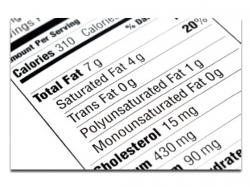Bakers Have Key Concerns With FDA's Nutrition Facts Panel Revisions
May 23, 2016 | 3 min to read

“The American Bakers Association is extremely disappointed that the Food & Drug Administration’s final rule revising the Nutrition Facts Panel failed to incorporate feedback on the compliance timeline from the baking industry and maintains a two-year implementation period that will be difficult to meet in the best of circumstances and will significantly add to implementation costs for baking companies of all sizes.” said Lee Sanders, ABA Senior Vice President for Government Relations and Public Affairs.
While ABA thoroughly reviews the 943-page nutrition facts panel final rule, there are some key items that ABA wants to address in its initial statement:
Fiber Definition
A critical issue addressed with the NFP final rule is the definition of fiber. ABA appreciates that FDA adopted a number of our comments on the dietary fiber definition. Specifically, FDA changed “isolated and synthetic” to “isolated or synthetic” in response to ABA comments, which helps reflect that fibers that are isolated are not synthetic. FDA also included psyllium husk within the definition of dietary fiber.
Unfortunately, FDA retained the definition of dietary fiber based on a showing of a beneficial physiological effect, rather than a chemical definition as is the case for most other nutrients.
On the positive side, FDA determined that the scientific evidence supports a showing of a beneficial physiological effect to human health from the following fibers: Cellulose, guar gum, pectin, locust bean gum, and hydroxypropylmethylcellulose, in addition to psyllium husk and others already listed in the proposed rule.
Regarding other carbohydrates mentioned in comments to the Agency, FDA stated that the comments did not provide data on beneficial physiological effects, so the Agency is unable to conduct a scientific review, but the Agency intends in the next few month “to publish a separate notice to seek comment on the available scientific data on non-digestible carbohydrates to assist us in the review of the scientific evidence. Publically available clinical trial data will be identified and summarized for non-digestible carbohydrates, including inulin, bamboo fiber, soy fiber, pea fiber, wheat fiber, cotton seed fiber, sugar cane fiber, sugar beet fiber, and oat fiber.”, noted Ms. Sanders.
Added Sugar Labeling and 10% Daily Value
Another issue of great concern to bakers was the addition of added sugar labeling declaration and a ten percent daily reference value. “To assure that this change in policy is based on the fully body of scientific evidence, it would have been most appropriate for the National Academy of Science to have conducted an official Daily Reference Intake review before any policy changes were executed”, concluded Ms. Sanders.
Further, with regard that use fermentation, FDA noted that companies could petition for alternative compliance when measuring for added sugar labeling requirements. ABA will review this issue and others related to the final rules for NFP and serving size revisions at our upcoming June 7-8 Food Technical Regulatory Affairs Committee in Washington, DC.
###
About the American Bakers Association:
The American Bakers Association (ABA) is the Washington D.C.-based voice of the wholesale baking industry. Since 1897, ABA has represented the interests of bakers before the U.S. Congress, federal agencies, and international regulatory authorities. ABA advocates on behalf of more than 1000 baking facilities and baking company suppliers. ABA members produce bread, rolls, crackers, bagels, sweet goods, tortillas and many other wholesome, nutritious, baked products for America’s families. The baking industry generates more than $102 billion in economic activity annually and employs more than 706,000 highly skilled people.
Source: American Bakers Association
